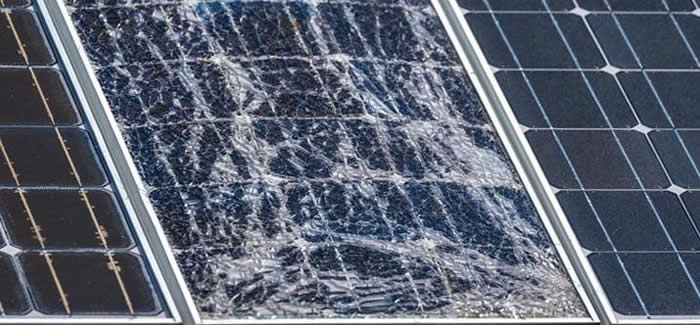
A badly damaged solar panel.
What caused it, and how common is any sort of panel failure?
Hail
The only thing that protects a solar panel from hail is the glass front.
If that glass is under 2mm thick, then it's possibly going to be damaged by large hail.
If it's standard thickness, 3.2mm, then it's less likely to be damaged.
Some panels have a glass backsheet instead of a plastic one.
The solar cells are inside a glass 'sandwich', front and back.
Great for corrosion and protection against flexing in the wind.
Not so great for hail because, to keep the weight and cost down, the front glass is often half the standard thickness.
Surprisingly, your home insurer will know a lot about this, and you should talk to them.
Usually, you would be covered for damage to panels by hail by your insurer.
It's also likely that the insurer will pay for ALL the panels being replaced, even if there is damage to just one.
This is because hail large enough to crack glass is also capable of damaging the cells and wiring inside any other panel.
That's a potential fire risk. That's why they usually pay for all of the panels to be replaced.
Installer incompetence.
Panels are large, heavy, and fragile.
If the installer handles them poorly from the wholesaler warehouse to your roof then they can get damaged.
Sometimes that damage is initially invisible. Micro-cracks.
Sometimes installers walk on panels. Can also cause micro-cracks.
Micro-cracks can expand into big cracks, cell failure, panel failure, burning, glass cracking.
Never walk on a solar panel, and watch how carefully your installers handle the panels from trailer to roof.
Manufacturing defects.
Not all that long ago, many solar panels were hand-soldered.
Now robots do all that and much more besides.
Taking humans out of the process is making solar panels much more reliable.
However, machines can develop faults, and that might mean a bad batch of panels.
Hopefully, the manufacturer's quality control procedures will intercept those panels.
It's in their interests to stop faulty panels going out, because warranty replacements are expensive for them.
How long do solar panels last?
Most of the solar panels we installed 13 years ago are fine. A big grubby around the edges usually.
But the power outputs, aren't usually down by more than 10% after those 13 years.
I'm using 13 years simply because that's when we started, so have first hand experience.
However, we have had some failures. So far, 30 failed panels now from about 15,000 installed up to 2014.
What's that...3 years, average of 10 failures from 5,000 installed a year = 0.2%.
Not too bad after that amount of time.
Those panels had 10-12 year warranties.
These days most panels have 25 year warranties.
I therefore expect the more modern, robot made panels to be much more reliable, even over 25 years.
So far, not a single panel we've installed since 2014 has failed.
How do we/you know that a panel has failed?
These days it is SO much easier.
Whilst having individual panel reporting using micro inverters or DC optimisers is great, it's not really needed.
We can connect to your inverter from our office, and check the voltages of each of the strings of panels.
Then we compare that to the panel datasheet expected voltage and usually it's obvious.
One string is producing 30V-40V less than it should would almost certainly mean a failed panel.
Most of the inverter reporting apps give YOU this same capability to check string voltages.
Does regular shading damage a solar panel?
Some say yes, shading makes 'hotspots' that eventually will burn out a cell.
Some others say that the diodes in the panel junction box, that turn off groups of cells when shaded, will fail from overuse.
Some say that the new half-cell design panels that we install these days greatly reduces these risks.
I say all of the above is likely to be correct.
I also say avoid installing panels in regular shaded places in the first place.
Sorry to get all narky about cheap and not so cheerful solar companies and their installers but...
If someone is being paid peanuts to install solar as fast as possible then they always just 'whack' em in wherever.
Panels right under A/C units, TV Antennas, Chimney's Flues, all the obvious things to avoid, aren't avoided.
Which are the most reliable solar panels?
Good question.
If the panels were handled perfectly, installed correctly then why should any panel fail?
It would mostly come down to manufacturing process, components, design, packaging and quality control.
The obvious answer would be that the most expensive panels are the most likely going to be the most reliable.
That would currently be the Maxeon model under the SunPower brand and the Alpha Pure/Pure R, from the REC brand.
Do I think that it is significantly more likely that a much cheaper JinKo, LonGi, Trina etc panel will fail within the next 25 years?
No. I think a failure rate of 1 in 6,000 over 25 years for the most expensive panels is a reasonable guess.
If the cheaper JinKo, Trinas etc were half as reliable, that's still 1 in 3,000 over 25 years.
If you had 30 panels on your roof that might be a 30 in 3,000 risk or 1% over 25 years.
A risk, yes, but 99% of people by the same maths, would have no problem at all.
If I'm correct about the risks, then an extra 0.5% of people will have no issue with the most expensive panels.
...don't panic
There is one very simple thing you can do to minimise your risk of future faulty panels.
Keep a watchful eye on the installers when they transport your panels from van to roof.
This usually happens about 2-3 hours after they arrive. The roof fixings and rail and cables go in first.
Make it obvious to them that you are watching them or recording them on your phone.
"Heh, I just want to keep a record of this exciting event", you can say with a smile on your face.
I really can't recommend you actually say to them, "Please treat my panels carefully and don't walk on them"
That is likely to have the opposite result to what you hoped for.
(08) 9467 9655
or email
This review was written by Andrew MacKeith, Solar4Ever service manager since 2011.
Solar4Ever is located in Morley (Perth), WA 6062
